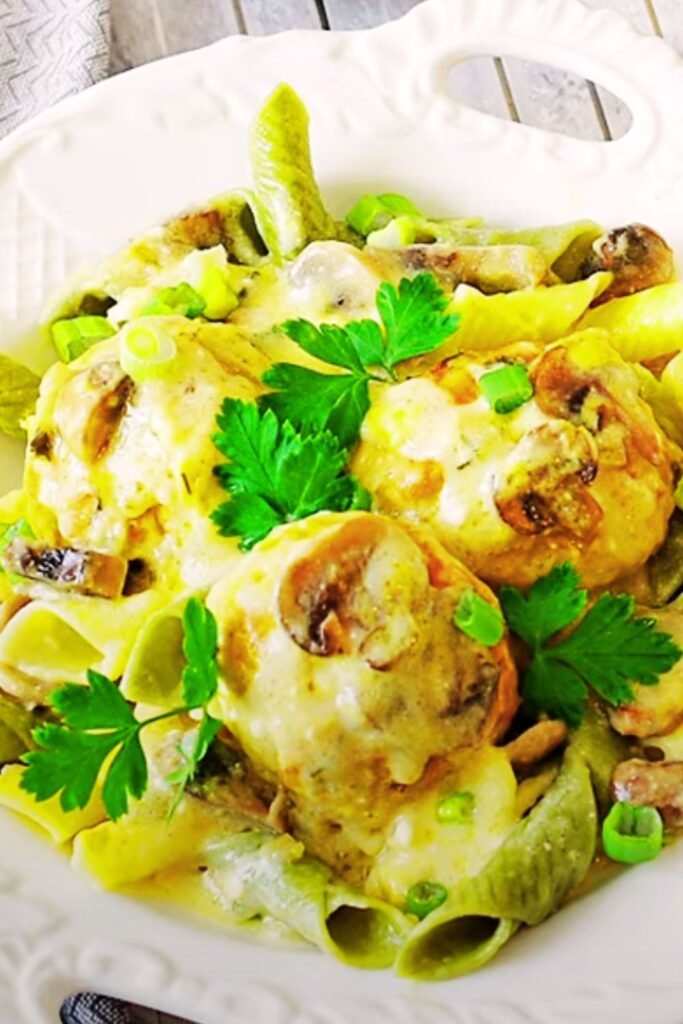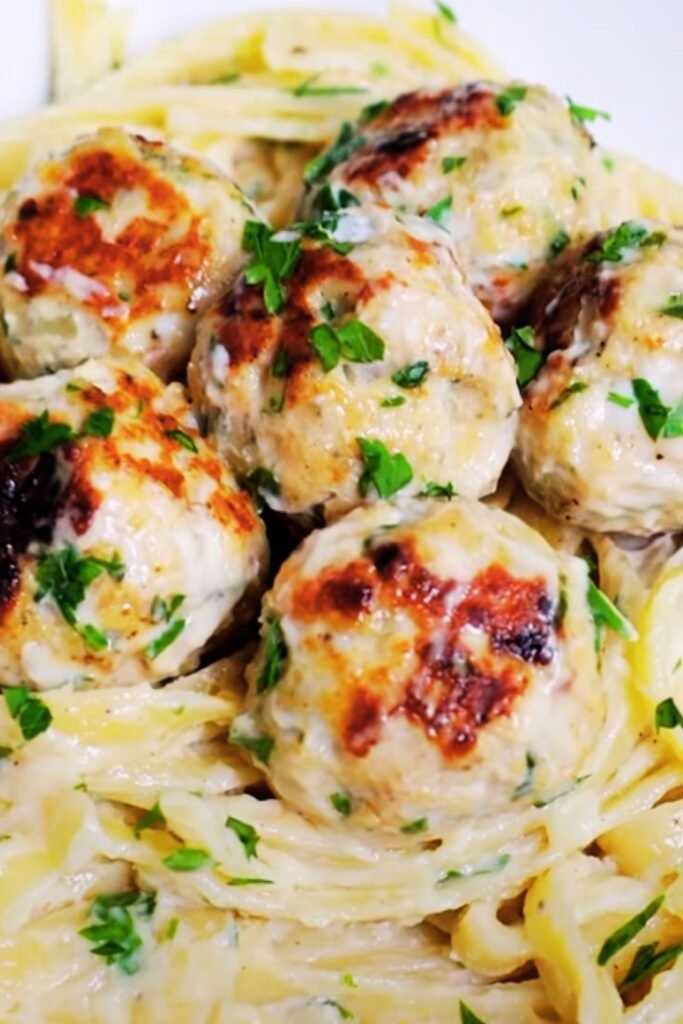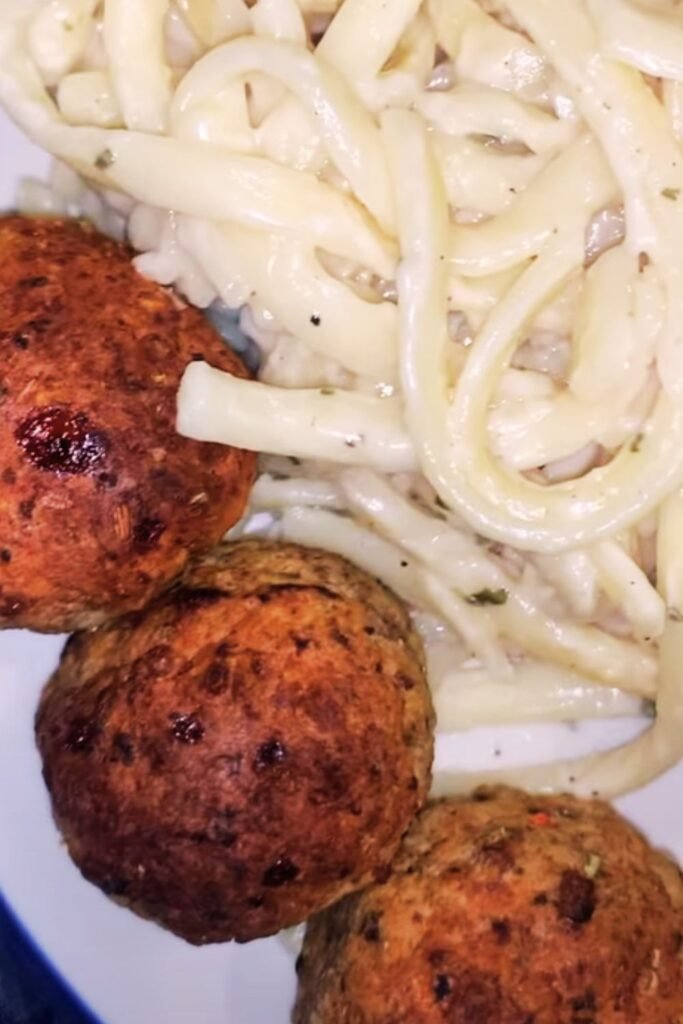There’s something magical about the perfect meatball. That first bite that yields to your fork, revealing a tender, juicy interior that’s packed with flavor. Now imagine those meatballs nestled in a velvety spinach Alfredo sauce that coats every strand of pasta. My friends, I’m about to share one of my absolute favorite comfort food recipes that elevates the humble meatball to gourmet status.
I discovered this recipe during a particularly cold winter when I was craving something indulgent yet not too heavy. By swapping traditional beef for chicken and incorporating creamy ricotta, these meatballs maintain a light texture while delivering maximum flavor. The spinach Alfredo sauce adds a touch of elegance and nutritional value to what has become my go-to dish for both weeknight dinners and special occasions.
What makes this dish truly shine is the harmonious balance of flavors and textures. The delicate chicken meatballs, enriched with ricotta, provide a perfect counterpoint to the rich, velvety spinach Alfredo sauce. Each component complements the others, creating a symphony of taste that will have your dinner guests begging for seconds (and the recipe).
The Magic Behind Chicken Ricotta Meatballs
Traditional meatballs often rely on beef, pork, or a combination of both. But chicken meatballs offer a lighter alternative that’s equally satisfying when prepared properly. The secret to preventing them from becoming dry or tough lies in the addition of ricotta cheese.
Ricotta works double duty in this recipe:
- It adds moisture, ensuring your meatballs remain tender and juicy
- It contributes a subtle creaminess that enhances the overall flavor profile
The flavor profile of these meatballs is enhanced with fresh herbs, garlic, and Parmesan cheese. I’ve found that the combination of basil and parsley brings a bright freshness that balances the richness of the Alfredo sauce.
Ingredients You’ll Need
For the Chicken Ricotta Meatballs:
- 1 pound ground chicken (preferably thigh meat for more flavor)
- ¾ cup whole milk ricotta cheese
- ½ cup freshly grated Parmesan cheese
- ¼ cup panko breadcrumbs
- 2 tablespoons fresh parsley, finely chopped
- 2 tablespoons fresh basil, finely chopped
- 2 garlic cloves, minced
- 1 large egg
- 1 teaspoon lemon zest
- ½ teaspoon salt
- ¼ teaspoon freshly ground black pepper
- 2 tablespoons olive oil (for cooking)
For the Spinach Alfredo Sauce:
- 3 tablespoons unsalted butter
- 3 garlic cloves, minced
- 2 tablespoons all-purpose flour
- 2 cups whole milk
- 1 cup heavy cream
- 1 cup freshly grated Parmesan cheese
- 4 cups fresh spinach, roughly chopped
- ¼ teaspoon freshly grated nutmeg
- Salt and freshly ground black pepper to taste
Additional Components:
- 1 pound fettuccine or pappardelle pasta
- Fresh basil leaves for garnish
- Extra Parmesan cheese for serving
- Red pepper flakes (optional)
Step-by-Step Instructions
Preparing the Meatballs:
- In a large mixing bowl, combine the ground chicken, ricotta, Parmesan, breadcrumbs, parsley, basil, garlic, egg, lemon zest, salt, and pepper.
- Mix gently with your hands until just combined. Avoid overmixing, which can make the meatballs tough.
- With damp hands (to prevent sticking), form the mixture into meatballs about 1½ inches in diameter. You should get approximately 18-20 meatballs.
- Place the formed meatballs on a parchment-lined baking sheet and refrigerate for 20 minutes to firm up.
- Heat olive oil in a large skillet over medium heat. Once hot, add the meatballs in batches, being careful not to overcrowd the pan.
- Brown the meatballs on all sides, about 2-3 minutes per side. They don’t need to be cooked through completely as they’ll finish cooking in the sauce.
- Transfer the browned meatballs to a plate and set aside.

Creating the Spinach Alfredo Sauce:
- In the same skillet used for the meatballs (don’t clean it out – those browned bits add flavor!), melt the butter over medium heat.
- Add the minced garlic and sauté until fragrant, about 30 seconds, being careful not to let it brown.
- Sprinkle the flour over the butter and garlic, whisking constantly for about 1 minute to create a roux.
- Gradually whisk in the milk and cream, ensuring there are no lumps.
- Bring the mixture to a simmer, then reduce heat to medium-low and cook, stirring occasionally, until the sauce thickens enough to coat the back of a spoon, about 5-7 minutes.
- Stir in the Parmesan cheese until melted and fully incorporated.
- Add the chopped spinach and stir until wilted, about 2 minutes.
- Season with nutmeg, salt, and pepper to taste.
Bringing It All Together:
- Gently add the browned meatballs to the sauce, spooning some sauce over them.
- Cover and simmer on low heat for 10-12 minutes, or until the meatballs are cooked through (internal temperature of 165°F).
- While the meatballs finish cooking, bring a large pot of salted water to a boil.
- Cook the pasta according to package instructions until al dente.
- Drain the pasta, reserving ½ cup of pasta water.
- If the sauce seems too thick, thin it out with a splash of the reserved pasta water.
- You can either add the pasta directly to the sauce and meatballs, tossing to coat, or serve the pasta with the meatballs and sauce on top.
- Garnish with fresh basil leaves and additional Parmesan cheese.
Tips for Perfect Chicken Ricotta Meatballs
I’ve made this recipe countless times, and through trial and error, I’ve discovered some tips that make a significant difference in the final result:
| Tip | Explanation | Why It Matters |
|---|---|---|
| Use ground chicken thigh | Higher fat content than breast meat | Produces juicier, more flavorful meatballs |
| Chill the meatball mixture | 20 minutes in the refrigerator before forming | Helps meatballs hold their shape during cooking |
| Use damp hands | When forming the meatballs | Prevents the mixture from sticking to your hands |
| Don’t overcrowd the pan | Cook meatballs in batches if necessary | Ensures proper browning rather than steaming |
| Brown meatballs first | Before adding to the sauce | Creates a flavor-packed exterior and helps them hold together |
| Finish cooking in sauce | Rather than cooking through in the pan | Allows meatballs to absorb sauce flavors and stay moist |
| Check internal temperature | Should reach 165°F | Ensures food safety without overcooking |
Making the Creamiest Spinach Alfredo Sauce
The Alfredo sauce is equally important to this dish’s success. Here are my secrets for creating the silkiest, most flavorful sauce:
The Base: Roux vs. Straight Cream
Traditional Alfredo sauce often skips the roux (butter and flour mixture), relying solely on reducing cream and incorporating cheese. However, I find that starting with a light roux provides several advantages:
- Creates a more stable sauce that’s less likely to separate
- Allows for the use of milk alongside heavy cream, reducing some of the richness without sacrificing creaminess
- Helps the sauce cling better to both pasta and meatballs
Temperature Management
Temperature control is crucial when making Alfredo sauce:
- Never boil the sauce after adding cheese – this will cause it to separate and become grainy.
- Remove the pan from heat before incorporating cheese and stir until melted.
- Return to low heat if necessary to complete melting, but watch carefully.
Cheese Selection
The quality of your Parmesan makes a big difference:
- Use freshly grated Parmigiano-Reggiano or Grana Padano rather than pre-grated cheese
- Pre-grated cheese often contains anti-caking agents that can make your sauce grainy
- Grate it yourself using the fine side of a box grater or a microplane

Nutritional Benefits
This dish offers a balanced approach to comfort food with several nutritional advantages:
| Ingredient | Nutritional Benefit |
|---|---|
| Ground chicken | Leaner protein source compared to beef or pork |
| Ricotta cheese | Provides calcium, protein, and a creamy texture with fewer calories than heavy cream |
| Fresh spinach | Rich in iron, vitamins A and C, and fiber |
| Fresh herbs | Contains antioxidants and enhances flavor without added sodium |
| Garlic | Has antimicrobial properties and adds depth of flavor |
| Whole grain pasta option | Increases fiber content if substituted for regular pasta |
Variations to Try
While I love this recipe as written, I occasionally make adaptations based on what’s in my pantry or to suit different dietary needs:
Alternative Proteins
- Ground turkey: Substitute directly for chicken for a similar flavor profile
- Plant-based ground meat substitute: Works well in this recipe with a slight increase in herbs and garlic
- Seafood option: Replace chicken with a mixture of chopped raw shrimp and scallops (reduce cooking time)
Sauce Variations
- Roasted red pepper Alfredo: Blend 1 cup roasted red peppers into the sauce for a vibrant color and sweet pepper flavor
- Pesto Alfredo fusion: Stir 2 tablespoons of prepared pesto into the finished sauce
- Lighter version: Use all milk instead of cream and increase the amount of spinach
Pasta Choices
While fettuccine is classic with Alfredo sauce, consider these alternatives:
- Pappardelle: Wide ribbons that catch the sauce beautifully
- Rigatoni or penne: The tubes capture sauce inside and out
- Zucchini noodles: For a low-carb option
- Whole wheat or chickpea pasta: For added fiber and nutrients
Make-Ahead and Storage Options
This dish is perfect for meal prep and actually improves in flavor the next day:
Make-Ahead Options:
- Prepare the meatballs in advance: Form, cook, and refrigerate for up to 2 days or freeze for up to 3 months.
- Make the sauce ahead: Prepare without spinach and refrigerate for up to 3 days. Reheat gently and add fresh spinach when ready to serve.
- Complete dish: Assemble the entire dish without pasta, refrigerate for up to 2 days, and reheat gently on the stovetop.
Freezing Instructions:
- Meatballs: Freeze cooked meatballs on a baking sheet until solid, then transfer to a freezer bag for up to 3 months.
- Complete dish: Freeze in an airtight container for up to 2 months (sauce may separate slightly when thawed but can be whisked back together).
- Do not freeze: Pasta should be cooked fresh for the best texture.
Reheating Guidelines:
- Stovetop: The preferred method. Heat gently over medium-low heat with a splash of milk or cream to refresh the sauce.
- Microwave: Use 50% power in short intervals, stirring between each, to prevent sauce separation.
- Oven: Cover with foil and heat at 325°F until warmed through, about 20 minutes.
Serving Suggestions
To create a complete meal experience, consider these complementary dishes:
Side Dishes
- Garlic bread: The classic pairing, perfect for sopping up extra sauce
- Simple green salad: With a light vinaigrette to balance the richness
- Roasted asparagus or broccolini: Adds color and a different texture
- Sautéed mushrooms: Enhances the umami flavors in the dish
For a Special Occasion
Transform this dish into an elegant dinner party centerpiece:
- Serve in individual gratin dishes or shallow bowls
- Garnish with a chiffonade of fresh basil and a light dusting of microplaned Parmesan
- Add a small drizzle of high-quality extra virgin olive oil
- Include a twist of freshly cracked black pepper

Common Troubleshooting
Even experienced cooks occasionally encounter challenges. Here are solutions to the most common issues:
Meatball Problems
| Issue | Possible Cause | Solution |
|---|---|---|
| Meatballs fall apart during cooking | Mixture too wet or not chilled | Add extra breadcrumbs; ensure proper chilling time |
| Meatballs too dense | Overmixing or too many breadcrumbs | Mix just until combined; reduce breadcrumbs |
| Meatballs stick to the pan | Pan not hot enough or too little oil | Ensure oil is hot before adding meatballs; use non-stick pan |
| Meatballs not browning well | Overcrowding the pan | Cook in smaller batches with adequate space between each |
Sauce Issues
| Issue | Possible Cause | Solution |
|---|---|---|
| Sauce too thin | Insufficient cooking time or roux | Continue simmering to reduce; mix 1 tsp cornstarch with water and add if needed |
| Sauce too thick | Too much reduction | Add pasta water or milk to thin to desired consistency |
| Grainy or separated sauce | Too high heat or boiling after cheese added | Remove from heat, add cold butter, and whisk vigorously |
| Bland sauce | Insufficient seasoning | Add more salt, fresh pepper, and consider a pinch of red pepper flakes |
Health Adaptations
For those with dietary restrictions, this recipe can be modified:
Lower Calorie Version
- Use ground chicken breast instead of thigh
- Substitute part-skim ricotta
- Replace half the heavy cream with chicken broth
- Increase the spinach quantity
Gluten-Free Adaptation
- Use gluten-free breadcrumbs in the meatballs
- Substitute cornstarch or rice flour for the all-purpose flour in the sauce
- Serve with gluten-free pasta or zucchini noodles
Dairy-Free Option
- Replace ricotta with dairy-free ricotta alternative or pureed silken tofu
- Use dairy-free butter, milk, and cream substitutes
- Nutritional yeast can replace some of the Parmesan flavor
Why This Recipe Works
As someone who has prepared this dish countless times, I can attest to why it’s become a favorite among friends and family:
- Balance of flavors: The mild chicken and creamy ricotta provide a perfect canvas for the herbs and garlic without overwhelming them.
- Textural contrast: Tender meatballs against the silky sauce create a pleasing mouthfeel.
- Visual appeal: The green spinach adds beautiful color against the cream sauce and golden meatballs.
- Sophistication without difficulty: While impressive enough for company, the techniques involved are straightforward.
- Versatility: The dish can be dressed up for special occasions or simplified for weeknight dinners.
Frequently Asked Questions
Q: Can I make these meatballs with ground beef instead of chicken?
A: Absolutely! Ground beef will work well, though the flavor profile will be stronger. I recommend using a leaner blend (85/15) to prevent the meatballs from becoming too greasy.
Q: Is there a way to make this dish ahead for a dinner party?
A: Yes! Prepare the meatballs and sauce up to two days ahead and refrigerate separately. On the day of your party, gently reheat the sauce, add the meatballs to finish cooking, and prepare fresh pasta just before serving.
Q: Can I bake the meatballs instead of pan-frying them?
A: Definitely. Arrange them on a parchment-lined baking sheet and bake at 400°F for about 15 minutes until browned. Then add them to the sauce to finish cooking. This method is great when making a larger batch.
Q: My sauce separated and looks grainy. Can I fix it?
A: Remove the sauce from heat immediately and whisk in a tablespoon of cold butter or cream. Continue whisking vigorously until the sauce becomes smooth again. Always remember to keep the heat low when adding cheese.
Q: What can I use instead of spinach?
A: Kale, Swiss chard, or arugula make excellent substitutions. For kale or chard, remove the tough stems and allow a slightly longer cooking time. Arugula will add a peppery flavor that complements the creamy sauce beautifully.
Q: How can I tell when the meatballs are fully cooked?
A: The safest method is using an instant-read thermometer, which should register 165°F when inserted into the center of a meatball. Alternatively, cut one open – it should be opaque throughout with no pink remaining.
Q: My family doesn’t like visible spinach. Can I still get the nutrition without the green flecks?
A: Yes! Blanch the spinach separately, squeeze out excess water, and puree it in a blender before stirring into the sauce. This creates a beautiful light green sauce with all the nutrition but none of the texture that some find objectionable.
Final Thoughts
There’s something profoundly satisfying about creating a dish that brings people together around the table, faces lit with anticipation and delight. This Creamy Chicken Ricotta Meatballs with Spinach Alfredo recipe has been that dish for me – reliable yet special, comforting yet elevated.
What began as a simple experiment on a cold winter evening has evolved into my signature dish, requested at gatherings and lovingly prepared when comfort is needed. The beauty of cooking lies not just in the flavors we create but in the memories we build around them.
I encourage you to make this recipe your own. Perhaps you’ll add a personal touch – a different herb, a sprinkle of lemon zest on the finished dish, or a particular pasta shape that speaks to you. Whatever adaptations you make, I hope this dish brings as much joy to your table as it has to mine.